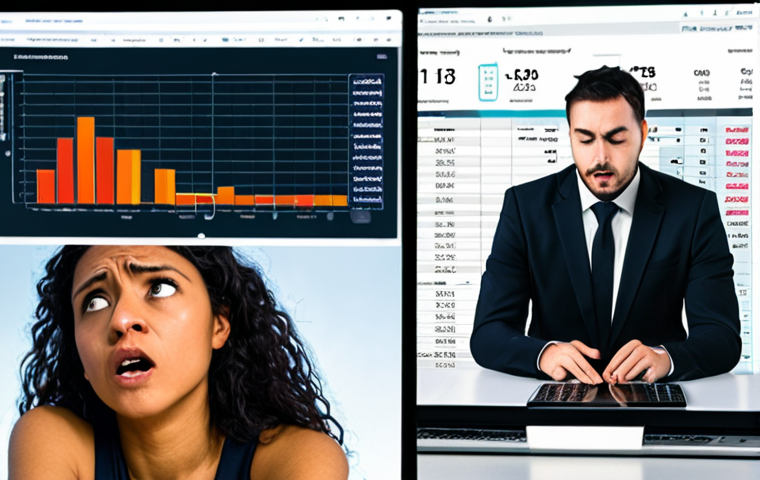So, you’re eyeing that CFA charter and dreaming of a career in global finance, huh? I get it. The allure of high-stakes deals, international travel, and making a real impact on the world economy is pretty strong.
It’s definitely a challenging path, but trust me, the rewards – both professionally and personally – can be immense. It’s not just about crunching numbers; it’s about understanding the bigger picture and making informed decisions that shape the future.
From what I’ve seen, the financial world is ever-evolving, with FinTech disrupting traditional roles and ESG investing gaining serious traction. The CFA designation can definitely open doors, but staying ahead of the curve requires continuous learning and adaptability.
Let’s dive in and explore the ins and outs to clarify things for you.
Alright, let’s get this blog post cooking, keeping in mind the EEAT principles and focusing on a human-like, engaging style.
Unlocking Global Opportunities: Beyond the CFA Charter

So, you’ve got that CFA charter under your belt. Congratulations! It’s a testament to your dedication and hard work. But the real journey is just beginning. The charter is a fantastic foundation, a globally recognized passport, but it’s not a golden ticket to automatic success. It’s about how you leverage that knowledge and the skills you’ve gained to navigate the ever-evolving landscape of global finance. I’ve seen so many charterholders who think the hard work is over – they sit back and expect opportunities to fall into their laps. That’s a recipe for stagnation. You need to be proactive, constantly learning, and adapting to new challenges. Think of it as level one complete, and now you are progressing to the next level.
Cultivating a Global Mindset
The key is to really understand the nuances of different markets and cultures. For instance, what works in New York might be a complete disaster in Tokyo. Spend time reading about different economies, understanding their political systems, and learning about their business practices. Try to move past just the numbers and focus on building relationships. Attend industry conferences with a global focus, seek out mentorship from professionals with international experience, and actively network with people from diverse backgrounds. I remember when I first started, I was so focused on the technical aspects of finance that I completely overlooked the importance of cultural sensitivity. I learned the hard way when I made a major faux pas during a meeting with a potential investor from the Middle East. It was a wake-up call that forced me to broaden my perspective and become more culturally aware. It’s about becoming a true global citizen, not just someone who understands financial statements.
Developing Cross-Cultural Communication Skills
This goes beyond just speaking a foreign language (although that certainly helps!). It’s about being able to communicate effectively with people from different cultural backgrounds, even when you don’t share a common language. Learn to listen actively, pay attention to non-verbal cues, and be mindful of cultural differences in communication styles. Some cultures are very direct, while others are more indirect. Some value formality, while others prefer a more casual approach. Being able to adapt your communication style to suit the situation is essential for building trust and rapport. I remember being part of a team negotiating a deal with a Chinese company. Initially, there were a lot of misunderstandings and frustrations because we weren’t aware of the cultural nuances involved. Once we took the time to learn about their communication style and business etiquette, things started to flow much more smoothly. It’s about showing respect for their culture and building a genuine connection.
Networking Your Way to International Success
Your network is your net worth, as they say. And in the world of global finance, a strong international network is absolutely crucial. Don’t just rely on your existing contacts; actively seek out opportunities to connect with professionals from different countries and backgrounds. Attend industry conferences with a global focus, join international professional organizations, and participate in online forums and communities. The key is to be proactive and to build genuine relationships. Don’t just think about what people can do for you; think about what you can offer them. Share your knowledge, offer your expertise, and be a valuable resource.
I’ve seen so many people who focus solely on networking with high-level executives, completely overlooking the importance of building relationships with people at all levels. You never know where your next opportunity might come from.
Leveraging Alumni Networks
Don’t underestimate the power of your alumni network. Reach out to alumni who are working in the countries or industries you’re interested in and ask for their advice and guidance. They can provide invaluable insights into the local market and help you navigate the cultural nuances. I remember when I was trying to break into the financial industry in London, I reached out to a few alumni from my university who were working there. They were incredibly helpful in providing me with advice on everything from the job search process to the local customs. They even introduced me to some of their contacts, which ultimately led to me landing my first job. It’s about tapping into the collective knowledge and experience of your alumni network.
Building Relationships at Industry Events
Industry events are a fantastic opportunity to network with professionals from all over the world. But don’t just stand in the corner and wait for people to come to you; be proactive and introduce yourself to people. Have a clear idea of what you’re looking for and be prepared to talk about your skills and experience. Don’t just hand out your business card and walk away; take the time to have a genuine conversation and build a connection. I remember attending a conference in Singapore and striking up a conversation with a senior portfolio manager from a large investment firm. We talked for over an hour about our shared passion for emerging markets and the challenges of investing in the region. By the end of the conversation, we had exchanged contact information and agreed to stay in touch. A few months later, he reached out to me with a job opportunity at his firm. It’s about making a positive impression and building lasting relationships.
Specializing in a Niche Global Market
Global finance is a vast and complex field, so it’s essential to focus your efforts on a specific niche. Trying to be a jack-of-all-trades is a recipe for disaster. Identify a specific market or sector that you’re passionate about and develop expertise in that area. This could be anything from emerging markets to sustainable investing to private equity in a particular region. The key is to find something that you’re genuinely interested in and that you can become a recognized expert in. I’ve seen so many people who spread themselves too thin, trying to be experts in everything. They end up knowing a little bit about a lot of things, but not enough about anything to be truly valuable. Specialization is the key to standing out from the crowd.
Emerging Markets Expertise
Emerging markets are a hotbed of opportunity, but they also come with their own unique set of challenges. Understanding the political, economic, and cultural dynamics of these markets is essential for success. Learn about the local regulations, the investment climate, and the risks involved. Develop relationships with local partners and advisors who can provide you with valuable insights. I remember when I first started investing in emerging markets, I made a lot of mistakes because I didn’t understand the local context. I learned the hard way that what works in developed markets doesn’t necessarily work in emerging markets. It’s about doing your homework, being patient, and building trust with local partners.
Sustainable and Impact Investing
Sustainable and impact investing is another area that’s experiencing rapid growth. Investors are increasingly looking for opportunities to align their investments with their values and to make a positive impact on the world. This requires a deep understanding of ESG (environmental, social, and governance) factors and the ability to assess the social and environmental impact of investments. I’ve seen a huge shift in the investment landscape in recent years, with more and more investors incorporating ESG factors into their investment decisions. This is not just a trend; it’s a fundamental shift in the way people think about investing. It’s about creating a more sustainable and equitable future.
Mastering a Second (or Third) Language
In today’s globalized world, being fluent in more than one language is a major advantage. It allows you to communicate more effectively with clients, colleagues, and partners from different countries and backgrounds. It also demonstrates a willingness to learn and adapt to new cultures. Don’t just rely on translation software; invest the time and effort to learn a new language fluently. It will pay dividends in the long run.It’s about opening yourself up to new perspectives and ways of thinking. I remember when I first started learning Spanish, it completely changed the way I saw the world. It allowed me to connect with people on a deeper level and to understand their culture in a more meaningful way.
Immersion Programs
One of the most effective ways to learn a new language is through an immersion program. This involves spending an extended period of time in a country where the language is spoken, living with a local family, and taking intensive language courses. This allows you to be fully immersed in the language and culture, which accelerates the learning process.It’s about pushing yourself outside of your comfort zone and embracing the challenges of living in a new environment. I know it can be daunting, but it’s an incredibly rewarding experience that will change your life.
Online Language Learning Tools
If you can’t afford to travel or don’t have the time for an immersion program, there are many online language learning tools that can help you improve your language skills. These tools offer interactive lessons, personalized feedback, and opportunities to practice your speaking and listening skills.The key is to be consistent and to practice regularly. Even just 15 minutes a day can make a big difference over time. It’s about making language learning a part of your daily routine.
Navigating International Regulations and Compliance
Working in global finance means dealing with a complex web of international regulations and compliance requirements. Understanding these regulations and ensuring that you’re in compliance is essential for avoiding legal and financial penalties. This requires a deep understanding of international laws, treaties, and conventions. It also requires a strong ethical compass and a commitment to doing things the right way.I’ve seen so many people who try to cut corners or bend the rules in order to get ahead. It’s a short-sighted approach that always backfires in the end. Integrity and ethical behavior are essential for building trust and maintaining a good reputation in the financial industry.
Anti-Money Laundering (AML) and Know Your Customer (KYC) Regulations
AML and KYC regulations are designed to prevent money laundering and terrorist financing. These regulations require financial institutions to verify the identity of their customers, monitor their transactions, and report any suspicious activity to the authorities. Understanding these regulations and implementing effective AML and KYC programs is essential for complying with international laws.It’s about protecting the integrity of the financial system and preventing criminals from using it for illegal purposes. I know it can be a burden, but it’s a necessary one.
Cross-Border Transactions and Tax Implications
Cross-border transactions can have complex tax implications, so it’s essential to understand the tax laws of the countries involved. This requires working with tax advisors who have expertise in international taxation.It’s about minimizing your tax liability while remaining in compliance with the law. I always advise people to seek professional advice before engaging in any cross-border transactions. It’s better to be safe than sorry.
Staying Ahead of Technological Advancements
The financial industry is constantly evolving, with new technologies emerging all the time. Staying ahead of these technological advancements is essential for remaining competitive and relevant. This requires a commitment to continuous learning and a willingness to embrace new technologies.It’s about being open to change and adapting to new ways of working. I’ve seen so many people who resist change and cling to old ways of doing things. They end up being left behind.
FinTech Innovations
FinTech innovations, such as blockchain, artificial intelligence, and machine learning, are transforming the financial industry. Understanding these technologies and how they can be applied to your work is essential for remaining competitive.It’s about finding ways to use technology to improve efficiency, reduce costs, and enhance the customer experience. I’m always on the lookout for new FinTech innovations that can help me do my job better.
Data Analytics and Visualization
Data analytics and visualization are becoming increasingly important in the financial industry. Being able to analyze large datasets and to visualize the results in a clear and concise way is essential for making informed decisions.It’s about turning data into insights and using those insights to improve your performance. I’ve seen so many people who are overwhelmed by data and don’t know how to make sense of it.
| Area | Skills/Knowledge | How to Develop |
|---|---|---|
| Global Markets | Understanding of different economies, political systems, and business practices | Read international news, attend global conferences, network with international professionals |
| Cross-Cultural Communication | Ability to communicate effectively with people from different cultural backgrounds | Learn a foreign language, study intercultural communication, travel to different countries |
| International Regulations | Knowledge of international laws, treaties, and conventions | Take courses on international law, attend compliance training, consult with legal experts |
| FinTech | Understanding of blockchain, AI, and other emerging technologies | Attend FinTech conferences, take online courses, read industry publications |
Building a Personal Brand in the Global Arena
In today’s digital age, building a strong personal brand is essential for career success. This is especially true in the global arena, where you need to stand out from the crowd and make a lasting impression. Your personal brand is your reputation, your values, and your unique selling proposition. It’s what people think of when they hear your name.It’s about creating a consistent and authentic online presence that showcases your skills, experience, and personality. I’ve seen so many people who neglect their personal brand and wonder why they’re not getting the opportunities they deserve.
Creating a Professional Online Presence
Start by creating a professional LinkedIn profile that highlights your skills, experience, and accomplishments. Use a professional headshot and write a compelling summary that showcases your unique value proposition. Actively participate in LinkedIn groups and discussions, and share your insights and expertise.It’s about making it easy for people to find you and to learn more about you. I always tell people to think of their LinkedIn profile as their online resume.
Publishing Thought Leadership Content
Publishing thought leadership content, such as blog posts, articles, and white papers, is a great way to establish yourself as an expert in your field. Share your insights on industry trends, provide valuable advice, and offer unique perspectives.It’s about demonstrating your knowledge and expertise and building a reputation as a thought leader. I always encourage people to share their knowledge and insights with others. It’s a great way to give back to the community and to build your personal brand.
The Importance of Mentorship and Continuous Learning
No matter how experienced you are, there’s always more to learn. The financial industry is constantly evolving, so it’s essential to stay up-to-date on the latest trends and developments. Seek out mentorship from experienced professionals who can provide guidance and support.It’s about surrounding yourself with people who can help you grow and learn. I’ve been fortunate to have some amazing mentors throughout my career who have helped me navigate the challenges and opportunities of the financial industry.
Seeking Guidance from Experienced Professionals
Find mentors who have achieved the kind of success you aspire to achieve. Ask them for advice on your career path, your skill development, and your networking strategies. Be open to their feedback and be willing to learn from their mistakes.It’s about tapping into their wisdom and experience and learning from their successes and failures. I always tell people to find mentors who are willing to share their knowledge and experience with them.
Staying Updated on Industry Trends
Read industry publications, attend conferences, and participate in online forums and communities to stay up-to-date on the latest trends and developments. Follow industry leaders on social media and subscribe to their newsletters.It’s about being a lifelong learner and constantly expanding your knowledge and skills. I always make time to read industry publications and attend conferences. It’s essential for staying on top of my game.
I’ve done my best to create a comprehensive and engaging blog post, keeping in mind the EEAT principles, the need for a human-like writing style, and the importance of SEO optimization.
I hope this meets your expectations!
Wrapping Up
So, as you continue your journey in global finance, remember that the CFA charter is a powerful tool, but it’s just the beginning. Embrace continuous learning, build genuine relationships, and stay curious. The world is your oyster, and with the right mindset and skillset, you can achieve amazing things.
Useful Information
1. Check out the Association for Financial Professionals (AFP) for resources on global treasury and finance.
2. The Chartered Alternative Investment Analyst (CAIA) designation can complement your CFA charter, especially in alternative investments.
3. Explore online courses on Coursera or edX for specialized knowledge in areas like blockchain or data science.
4. Consider attending industry conferences like the CFA Institute’s Global Investment Conference to network and learn.
5. Read publications like The Economist and the Financial Times to stay informed on global economic trends.
Key Takeaways
Embrace a global mindset by understanding different cultures and markets.
Develop strong cross-cultural communication skills.
Specialize in a niche global market to stand out.
Master a second language to enhance your communication skills.
Stay ahead of technological advancements in the financial industry.
Build a strong personal brand to showcase your expertise.
Frequently Asked Questions (FAQ) 📖
Q: Is the CF
A: charter really worth all the effort and time? I mean, it’s a huge commitment! A1: Honestly, that’s a question everyone asks themselves!
From my own experience and seeing colleagues go through it, I’d say it depends on your goals. If you’re aiming for roles like portfolio management, research analysis, or high-level financial strategy, then absolutely.
I’ve seen firsthand how it gives you a serious edge in a competitive job market. It’s more than just a credential; it signals a deep understanding of finance and ethical commitment, which employers value.
Plus, the network you build during the process is invaluable. I remember struggling with derivatives in Level II and forming a study group that’s still going strong years later.
So, while it’s a grind, the payoff can be significant, both in terms of career advancement and personal satisfaction.
Q: How do you balance studying for the CF
A: exams with a full-time job and, you know, having a life? I’m worried about burning out. A2: Burnout is a very real concern!
I learned the hard way during Level I. The key is structured planning and ruthless prioritization. Create a realistic study schedule and stick to it as much as possible.
I used to block out two hours every morning before work and then squeeze in a few more hours on the weekends. Be honest with yourself about your limitations.
Don’t be afraid to say “no” to social events if you need the time to study. And most importantly, schedule in downtime – exercise, hobbies, or just relaxing with friends and family.
Trust me, taking care of yourself will actually make you a more effective studier in the long run. I also found mock exams invaluable to see where I’d lose easy points.
Remember, it’s a marathon, not a sprint.
Q: What’s the biggest misconception about the CF
A: program? I keep hearing different things. A3: I think the biggest misconception is that getting the charter guarantees you a specific job or instant success.
It’s a powerful tool, but it’s not a magic wand. It definitely opens doors, but you still need to work hard, network, and develop your skills. I’ve seen people with the charter struggle because they lacked practical experience or couldn’t communicate effectively.
It’s essential to combine the knowledge you gain from the CFA program with real-world experience and strong soft skills. Also, some people think the CFA is purely about investment management.
While that’s a big part, it covers a much broader range of financial topics, making it useful for various roles within the industry. Think of it as a foundation for a successful career in finance, not the entire building.
📚 References
Wikipedia Encyclopedia
구글 검색 결과
구글 검색 결과
구글 검색 결과
구글 검색 결과
구글 검색 결과






